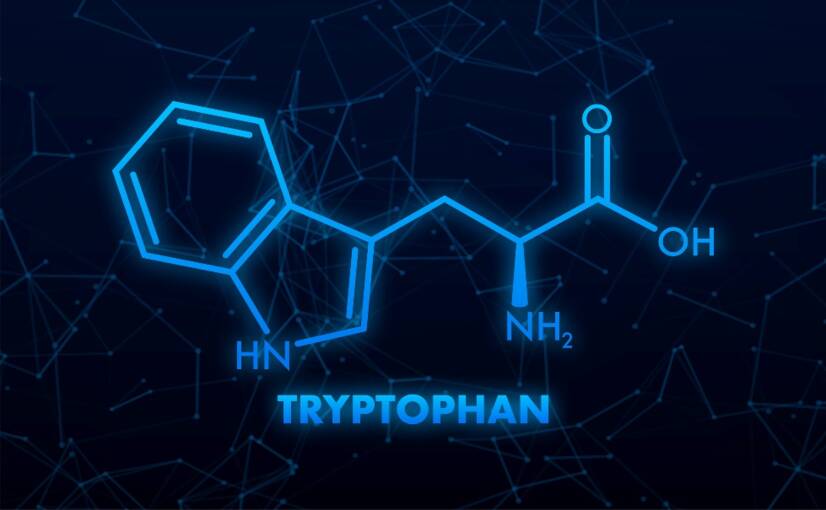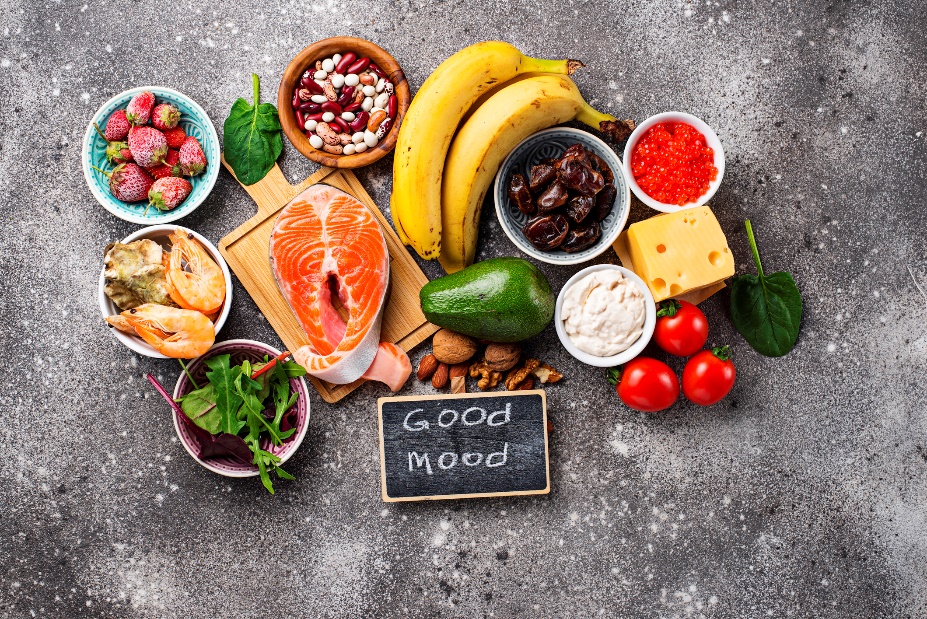- BREUNING, Loretta Graziano. Habits of a happy brain: teach your brain to produce more serotonin, dopamine, oxytocin, endorphins. Translated by Martina BRUNNEROVÁ. Olomouc: ANAG, [2021]. ISBN 978-80-7554-335-6
- solen.cz - L-tryptophan - a food component affecting mental health. Solen. Dana Kamarádová, Vilím Šimánek
- healthline.com - What Is Tryptophan? Healthline. Grant Tinsley, Ph.D., CSCS
- medicalnewstoday.com - What to know about L-tryptophan supplements. Medical News Today. Femi Aremu, PharmD
L-tryptophan and its effects on the body. Does it help with mood and sleep?

L-tryptophan is an essential amino acid that is needed primarily for the production of the happiness hormone serotonin. It is important for overall mental health and sleep. What effect does L-tryptophan have on the human body? Does it really help against depression and poor sleep?
Article content
L-tryptophan is an important substance that influences the production of the hormones serotonin and melatonin. Tryptophan enters the body from food and its deficiency can manifest itself in various psychological disorders.
L-tryptophan can therefore be considered as a prevention against various mood disorders and psychological problems.
The process of action, effects, food sources, dosage, dietary supplements and many other interesting information can be found in the article.
What is L-tryptophan?
L-tryptophan is an essential amino acid and a necessary component of proteins. Tryptophan is not produced by the human body itself and therefore needs to be supplied in the diet.
After absorption from food, L-tryptophan is converted into the molecule 5-HTP (5-hydroxytryptophan) and then from 5-HTP into the happiness hormone serotonin.
In the presence of vitamins B3 and B6, tryptophan is converted into the hormone serotonin. Serotonin is converted at night into melatonin, also known as the sleep hormone.
Serotonin is a neurotransmitter. It helps in the transmission of nerve signals in the brain and in the digestive tract, and affects the sleep process and the body's thermoregulation. Changes in serotonin levels in the brain can adversely affect current mood and general psychological state.
It has been scientifically confirmed that a lack of serotonin in the body manifests itself in poor mood, depression and disturbed sleep quality.
Melatonin is a hormone that directly affects sleep quality. It is secreted at night, and therefore at times when the individual is in the dark and not exposed to blue light (screens, displays, mobile phones...).
However, in addition to serotonin, L-tryptophan can also be converted into vitamin B3 (niacin) in the body.
If the human body has a sufficient supply of vitamin B3, this process does not take place. In this case, the amino acid L-tryptophan is mainly converted into the hormones serotonin and melatonin. Therefore, vitamin B3 is commonly added to dietary supplements containing tryptophan.
L-tryptophan deficiency can manifest itself in anxiety, a drop in mood, increased tension or nervousness and impulsivity.
Tryptophan, serotonin and melatonin
Experts point to the close interrelationship between tryptophan, serotonin and melatonin. From a psychological point of view, the molecule 5-HTP, which triggers serotonin production, is important.
In many cases, 5-HTP is used in the treatment of psychological disorders and insomnia. After serotonin is produced by L-tryptophan, serotonin can be converted at night into another very important substance, melatonin.
L-tryptophan has thus become the subject of many studies and researches in the prevention and treatment of depression and anxiety conditions.
Beneficial effects of L-tryptophan
Scientists have long investigated the link between low levels of L-tryptophan and symptoms of anxiety. In one study, positive psychological change was shown to be related to an increase in dietary tryptophan intake.
The main benefit of this amino acid is the stimulation of serotonin and the subsequent effect on mood and reduction of depressive states. People with deficient serotonin levels are more prone to depression and feelings of sadness or boredom.
Conversely, higher levels of serotonin improve mood and contribute to feelings of psychological relaxation.
Experts have also investigated the effect of tryptophan on cognitive functions such as learning or memory. Studies have shown that it is also closely related to information storage and processing in the brain.
Tryptophan in the form of dietary supplements is often associated with supporting energy metabolism and weight management.
L-tryptophan supports the synthesis of vitamin B3 (niacin), which is important for the conversion of micronutrients into energy. It is also an appetite-regulating vitamin. Although tryptophan calms the mind, it helps improve physical performance.
Possible effects of L-tryptophan supplementation:
- Stimulation of serotonin production
- Stimulation of melatonin production
- Promoting sleep quality
- Reduction of insomnia problems
- Promoting overall psychological well-being
- Increase mental and physical energy
- Reduction of anxiety states
- Reduce feelings of tension and stress
- Supporting immunity and the nervous system
- Support cognitive function
- Support the digestive system
- Support energy metabolism
Read also:
Will only sleeping pills really help? The thorny road to undisturbed sleep
Dietary sources of L-tryptophan
L-tryptophan is one of the amino acids found in plant and animal proteins.
Tryptophan is found in foods that are high in protein. These include meat, eggs, cheese, fish, nuts, seeds, tofu, legumes and others.
However, in order for tryptophan to be properly converted into the desired substance, the body must have enough B3, B6 and iron. From a nutritional standpoint, it is very important to consume a diet rich in protein.
If you eat a balanced, complete diet, you are most likely taking in both tryptophan and the substances needed to convert it.
However, in terms of the amount of L-tryptophan ingested, it is possible to talk about specific sources and raw materials. Some protein foods are characterized by high amounts of this amino acid.
Sources with a high content of tryptophan in the diet:
- Chicken
- Beef
- Eggs
- Salmon
- Shrimp
- Dairy products (cottage cheese)
- Beans
- Bananas
- Spinach
- Nuts and seeds (pumpkin)

Dietary supplements containing tryptophan
L-tryptophan should be taken regularly from the natural diet, but it can also be found in synthetic form in various dietary supplements.
There are currently quite a number of dietary supplements on the market containing L-tryptophan, whether powder, capsules or tablets. However, they should not be a substitute for a balanced diet.
For regular long-term use, the maximum dose is 1500 mg per day. For some, 200 to 500 g per day or even less may be sufficient.
The recommended daily dose should not be exceeded, as excessive use of tryptophan can lead to adverse health effects.
The prescribed dose does not apply to pharmacotherapy professionally prescribed by a physician for the treatment of certain medical conditions.
Dietary supplements are not intended for pregnant and lactating women and children.
Persons being treated in a psychiatric or neurological outpatient clinic should consult their physician regarding the appropriateness of taking this dietary supplement.
Side effects and contraindications
L-tryptophan has a number of health benefits, but the dietary supplement may cause unpleasant side effects in some individuals. However, side effects are not common.
Gastrointestinal effects such as heartburn, abdominal pain and a feeling of nausea may occur. Other side effects include headache or dry mouth. Rarer ones include dizziness, general weakness, difficulty breathing or blurred vision.
In this case, you should stop taking the dietary supplement and consult your doctor about your condition.
Do not take L-tryptophan if you are pregnant or breastfeeding. If you are trying to conceive, consult a gynaecologist about its use.
The dietary supplement is also not suitable for children.
Do not take Tryptophan if you have liver or kidney damage - consult your doctor.
Interesting resources
Related










